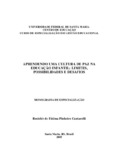| dc.contributor.advisor | Henz, Celso Ilgo | |
| dc.creator | Cantarelli, Rosiclér de Fátima Pinheiro | |
| dc.date.accessioned | 2016-04-25T14:43:33Z | |
| dc.date.available | 2016-04-25T14:43:33Z | |
| dc.date.issued | 2005-08-08 | |
| dc.date.submitted | 2005 | |
| dc.identifier.uri | http://repositorio.ufsm.br/handle/1/1510 | |
| dc.description | Monografia (especialização) - Universidade Federal de Santa Maria, Centro de Educação, Curso de Especialização em Gestão Educacional, RS, 2005. | por |
| dc.description.abstract | This study seeks to understand how the educators and students of Infantile
Education classes can learn a peace culture in the school atmosphere. The Education is
pointed for the peace as a possibility for a childhood and a more humanized society,
understanding that violence and peace are learned culturally and they are related to
politics, economy, social organization and education. It defends that the professionals
that act in the Infantile Education need to question themselves on the service of
something, who and what for they are exercising their role of educators, rethinking
their conceptions, to define with clarity that man, school and society type, they intend
to build. It is believed that the education of the childhood for a peace culture passes by
the way the school atmosphere is organized and by the lived experiences, that will
contribute to the humanization or dehumanization and for the society maintenance or
transformation. This research is characterized, methodological, by a study case, when
it tries to dialogue with the authors, with the observed reality and with the context in
which is inserted the subject of the research. It is based, mainly, into the light of Paulo
Freire's writings and kindred authors, which defend the education as a humanization
process. Authors as Guimarães and Xésus Jares that point to a peace conception,
related to the social justice, also contributed. It understands each other that the
educational actions have been revealing, in some moments, practices that make
possible the learning of a peace culture; in other, practices that contribute for the
dehumanization, signaling that the educators, most of the time, don't have clarity of
the reason and of the for something are addressing your action. It’ still pointed the
need that the professionals enlarge your understanding on the child for besides the
legal aspect. The peace conception also raises clarity and to deepen and it needs to be
understood as a practice susceptible to cultural learning. | eng |
| dc.language | por | por |
| dc.publisher | Universidade Federal de Santa Maria | por |
| dc.rights | Acesso Aberto | por |
| dc.subject | Educação | por |
| dc.subject | Cultura | por |
| dc.subject | Paz | por |
| dc.subject | Infância | por |
| dc.title | Aprendendo uma cultura de paz na educação infantil: limites, possibilidades e desafios | por |
| dc.title.alternative | Learning a peace culture in infantile education: limits, possibilities and challenges | eng |
| dc.type | Trabalho de Conclusão de Curso de Especialização | por |
| dc.degree.local | Santa Maria, RS, Brasil. | por |
| dc.degree.specialization | Gestão Educacional | por |
| dc.description.resumo | Este estudo busca compreender como os educadores e educandos das classes de Educação Infantil podem aprender uma cultura de paz no ambiente escolar. Aponta-se a Educação para a paz como possibilidade para uma infância e uma sociedade mais humanizada, entendendo que violência e paz são aprendidas culturalmente e têm relação com a política, a economia, a organização social e a educação. Esta pesquisa caracteriza-se, metodologicamente, pelo estudo de caso e alicerça-se, principalmente, à luz dos escritos de Paulo Freire e autores afins, que defendem a educação como um processo de humanização. Contribuem ainda, autores como Guimarães e Xésus Jares que apontam para uma concepção de paz, relacionada à justiça social. Entende-se que as ações docentes têm revelado, em alguns momentos, práticas que possibilitam a aprendizagem de uma cultura de paz; em outros, práticas que contribuem para a desumanização, sinalizando que os educadores, na maioria das vezes, não têm clareza do porquê e do para quê estão direcionando sua ação. Aponta-se ainda a necessidade de que os profissionais ampliem sua compreensão sobre a criança para além do aspecto legal. A concepção de paz também suscita clareza e aprofundamento, e precisa ser entendida como uma prática cultural passível de aprendizagem. | por |
| dc.publisher.unidade | Centro de Educação | por |


